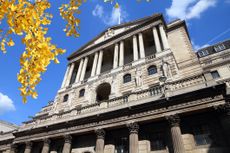UK wage growth hits a record high
Stubborn inflation fuels wage growth, hitting a 20-year record high. But unemployment jumps


UK wages have risen at a record annual rate - 7.3% higher in the three months to May compared to the same period last year.
The wage growth figures released by the Office for National Statistics today are based on average regular pay, not bonuses. The record high rate rises follows fears that inflation could remain stubbornly high and may spark further interest rate rises by the Bank of England.
Workers have been seeking pay rises to keep with the cost of living and rising food prices.
Subscribe to MoneyWeek
Subscribe to MoneyWeek today and get your first six magazine issues absolutely FREE

Sign up to Money Morning
Don't miss the latest investment and personal finances news, market analysis, plus money-saving tips with our free twice-daily newsletter
Don't miss the latest investment and personal finances news, market analysis, plus money-saving tips with our free twice-daily newsletter
Rise in unemployment
Despite wage growth, unemployment jumped from 3.8% to 4% in the three months to May compared to the previous quarter, hitting pre-pandemic levels. Job vacancies dropped by 85,000 in the period from April to June to 1,034,000, the twelfth consecutive fall, suggesting the job market is slowing.
Redundancies also rose by 0.2% per thousand employees to 3.3% per thousand employees; while this is below pre-pandemic levels, it does point to a weak economy.
Taking inflation into account, real pay was down 0.8% in comparison to a rise in headline wage growth, which means wages are still struggling to keep up with inflation with UK inflation at 8.7% and the cost of borrowing at an all-time high, with interest rates at 5%.
Sarah Coles, head of personal finance at Hargreaves Lansdown said: “Somehow, pay is simultaneously too high for the Bank of England’s liking, and yet too low to keep up with inflation.
“After CPI inflation, real total pay (including bonuses) fell 1.2% and real regular pay (excluding bonuses) fell 0.8%. Wages are closing in on inflation, but we’re still poorer with each passing month.”
Retirees return to the job market
The ONS also revealed that retirees are also increasingly returning to the workforce as they face shortfall in pensions and savings.
This drove a slight increase in employment figures to 76%, up 0.2% from the previous month, but still 0.6% below pre-pandemic levels. Retirees returning to work were predominantly men taking up part-time roles, rather than full-time.
Vaishali graduated in journalism from Leeds University and she has experience working with the likes of Leicester Mercury, Inews and The Week. She also comes from a marketing background, where she has done copywriting and content creation for businesses.
Currently writing about all things personal finance, Vaishali is passionate about finding the best deals around, whether it's the best credit cards or the cheapest personal loans, as well as sharing top money hacks to help people save and better manage their money.
-
-
 Top-quality small companies with big scope for long-term growth
Top-quality small companies with big scope for long-term growthA professional investor tells us where he’d put his money. This week: Dr Gareth Blades, analyst at Amati Global Investors, highlights three favourites.
By Nicole García Mérida Published
-
 Starling Bank hikes fixed savings rate to 5.25%
Starling Bank hikes fixed savings rate to 5.25%Starling Bank has hiked the rate on its fixed savings which has shot up from 3.25% to 5.25% - but how does it compare to the rest of the market?
By Vaishali Varu Published
-
 Bank of England raises interest rates to 5.25%
Bank of England raises interest rates to 5.25%The Bank has hiked rates from 5% to 5.25%, marking the 14th increase in a row. We explain what it means for savers and homeowners - and whether more rate rises are on the horizon
By Ruth Emery Published
-
 UK inflation remains at 8.7% ‒ what it means for your money
UK inflation remains at 8.7% ‒ what it means for your moneyInflation was unmoved at 8.7% in the 12 months to May. What does this ‘sticky’ rate of inflation mean for your money?
By John Fitzsimons Published
-
 VICE bankruptcy: how did it happen?
VICE bankruptcy: how did it happen?Was the VICE bankruptcy inevitable? We look into how the once multibillion-dollar came crashing down.
By Jane Lewis Published
-
 Would a food price cap actually work?
Would a food price cap actually work?Analysis The government is discussing plans to cap the prices of essentials. But could this intervention do more harm than good?
By Nicole García Mérida Published
-
 What is Warren Buffett’s net wealth?
What is Warren Buffett’s net wealth?Features Warren Buffett is one of the world’s richest people. But how did he make his money?
By Jacob Wolinsky Last updated
-
 What is Rihanna's net worth?
What is Rihanna's net worth?Features Rihanna became the youngest self-made billionaire in 2022. Here’s how she made her money.
By Jacob Wolinsky Published
-
 UK inflation slides to 8.7% - what does it mean for your money?
UK inflation slides to 8.7% - what does it mean for your money?News Inflation has dropped below 10% for the first time in months, but with food prices at a 45-year high, is this good news and what does it mean for your money?
By Tom Higgins Published
-
 What is Bill Gates's net worth?
What is Bill Gates's net worth?Features Bill Gates is one of the world’s richest people, but how did he make his money?
By Jacob Wolinsky Last updated









